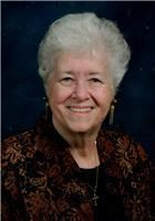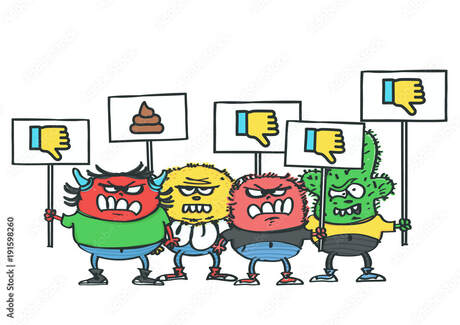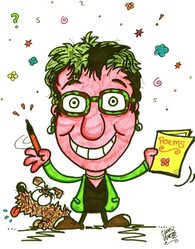|
Most of us write with at least one poet always on our minds. Some of us have numerous poetic "ghosts" flitting around us as we hammer away at our work. Whether it's Shakespeare, Tupac, Diane (or Dr.) Seuss, some of the voices in our heads aren't our own. Not wholly anyway.
It's a kind of cognitive alchemy where we read our favorite poets, the words take up a living space in our imaginations and they become part of us, where, in doing so, they change into something new altogether. This process of mingling minds is what poetry's all about, really. It's a soul to soul contact sport. And here's the really interesting thing about it: it doesn't matter who you are, or where your work is presented, if you do a good enough job as an artist, your words will pitch a tent in someone's mind, potentially a lot of someones. So think carefully about what you're offering. If your poems rub people rawly, this can be a very good thing for sparking thought. But if your poems leave people with a sick or miserable feeling, they'll avoid them in the future, unless they are one of the rare types who wants to feel miserable. I'm not saying you have to write happy things all the time; I'm saying: be aware that poems are like songs. They infect people. They're sticky. A great poem sticks even more than a great song. Even a single line such as : "Rage against the dying of the light" or "To be or not to be" can ring for centuries. The voices of poets in your head aren't trying to tell you how to write. They're trying to tell you why we write. If you remember that, you'll make better poems. If you find this poetry tip useful, consider picking up my Seven Secrets of Poetry guide. It's packed with tips and tricks. You can get it through the link below! Also, if you'd like to support the blog, I'd really appreciate your much-needed donation through PayPal [email protected] And if you'd like some expert help with editing or polishing your poems or you just want a bit of feedback, hit the links below.
2 Comments
I actually think competition is good for poets. From ancient days of yore when Greeks competed for laurel crowns right on through to today's poets trying for the most "likes" on social media, competition can be like electricity -- a source of fuel and excitement to keep you moving. Competitors are mentors. On the other hand, if you take it too far, you can crash and burn. So how can you tell when competition is healthy? Here's a few good signs: 1) You're inspired to write a lot. Not just about poetry, but actual poems. 2) You get excited when you see a new poem by your competitor (s). 3) You accept that you probably can't better what the competitor does best. 4) You integrate as much as you can from the competition even if it means doing away with some of your most treasured habits and riffs. 5) You feel or see a path forward for your own work and feel that you have energy for the journey. Now here are signs competition is getting to you: 1) You naysay your competitor's work. 2) You feel you've been treated "unfairly" by life, or readers, or publishers. 3) You refuse to edit, change, or revise your work. 4) You dig up old works that you feel never got their just due and wave them around even if no-one seems interested in them. 5) You have problems sleeping or concentrating on your work because you're busy trying to cut your competition down to size in your imagination, or dream up compensatory strengths for yourself. In any case, the point where you no longer feel the least bit competitive is when you'll probably start to lose interest in creating new things. Or you may just start repeating yourself. Competition keeps us fresh and "young" and, well, no matter how good you get -- you can always find someone to envy! Click the pic above to read about a very famous poetry competition! Categories All One of the more surprising things to me about being a poet is how many people try to stop you. From parents to teachers, spouses, friends, and rivals, it seems the one thing everyone agrees on is: you should be doing something else. Anything else. Just, please, don't write poems. Not in class. Not when you should be working. Not when the lawn needs mowed. Not when actually talented people can already do it better than you. Not when you don't have a degree. Not when you're too young. Not when you're too old. Not when this, not when that... Everyone, probably even your cat, has a sneaky reason for why you shouldn't write poetry. Some are not so sneaky. My mother, for example, literally took her contempt for my art to her deathbed. People will tell you things like: "nobody reads poetry" or "these days poetry is hip-hop" or "my favorite poet is Dr. Seuss" but what they're really trying to say is: you can't make any money with poems, so why bother? But that's their love talking. People who try to stop you because they think you're being irresponsible are just being conscientious hall monitors and stating the blatantly obvious. No point in telling them you think there might just be things as important, or even more important, than money because they won't believe you. Just know in your bones that nobody's opinion matters except your own. Creative people are, by nature, unbound and free of the constraints that others accept as obligatory and routine. As soon as your feet leave the ground, somebody's going to say: "You're going to fall. Gravity's real." But think of this. If a tightrope walker (without a net) walks the rope and nobody watching predicts her death, what's the point? You can't bring off your full creative effects without doubters. That's what the "peanut gallery" is all about. In fact, you need them to be pushed to greater heights. The people who stand around and criticize or try to undermine your efforts will help you soar and --- if you learn to leverage their gloom ---- gasp in awe as you dance the tightrope and jump through hoops of fire. Tally Poems Written: 300 Submissions: 50 Rejections: 17 (10 tiered) Acceptances: 0 Poem written today: "Poet's Place" Categories All One of the best things about being a poet is that every poem gives you a chance to get things right. If you don't like what you did in the last poem, or the last 20 poems, this poem is your chance to get everything in place. Whatever mistakes you may have made in the past are only pointers to use to get better. There's just basically something inherently hopeful in writing a poem. Even if the poem itself is a poem of grim and unrelenting doom. The very fact that you're writing a poem means you still believe in a few basic things such as human communication, artistic expression, and the capacity of language to conform to your emotions and thoughts. So when you face a blank screen or blank piece of paper or simply sitting alone with your creative thoughts, consider every moment and Act of Hope. Every poem you write ( up to a point) helps you write the next poem better. But what happens when that's no longer the case? Is it possible to reach your Peak as a poet? If you do, will you know? Can anybody tell you? You probably will reach a peak as a poet, but you probably won't know when it happens, and neither will anyone else. If you happen to write a very popular poem, or a very popular book of poems you may still write better poems even if they don't gain as much instant popularity. So I guess I'm trying to tell you to look at every poem you write (or try to write) with the belief that you're still getting better. Don't let doubt or fear stop you; don't let the past or social media stop you. the worst thing you can do as a poet is to stop growing. As long as you're writing your growing so just keep writing! If you'd like a bit of secret friendly help for your poems contact me through the Poem Polisher button below, or email me at [email protected] Categories All  Madelyn Eastlund Madelyn Eastlund This blog-post is dedicated to a great poet that I'm almost sure you've never heard of but definitely need to know. So, I want to introduce you to her work. But before I do, I'd like to sing out some personal praises for Madelyn Eastlund because she was one of my most important poetic mentors. Mentors are a big part of any artist's journey. I've had many. Some good; some not so good. Madelyn Eastlund is high on my "good mentors" list and there are many reasons for that. The first reason is that, early on in my writing career after publishing a handful of my poems in her Harp Strings Poetry Journal, she invited me to participate in Poet's Forum Magazine. PFM was a print magazine where poets published poems and commented on each others poems. This was an incredible experience and I learned to shop-talk and swap criticism with some of the most talented and ambitious poets around. From PFM I took away two indispensable lessons for any poet: 1) You're never as good as you think you are. 2) There's always somebody better. But, believe it or not, these are good things. Trust me, learning to face robust criticism from your peers (and potential audiences) and learning from that criticism will double your creative power. The second reason that Madelyn is one of my top mentors is because of her native talent and skill. She wrote dozens of exceptional poems and had a clear and consistent knack for setting, image, and theme. Yes, I did learn a few things from Madelyn Eastlund about how to stay prolific, as well as how to access and refine my own skills and I'll happily share a bit now and more in future blogs. But now let's turn to one of Madelyn's many excellent portrait-poems. The poem: "Grandma's Eighty-Fifth Birthday," is from a slim chapbook of Madelyn's titled Portraits. There's not a bad poem in the book, but I think this one's my favorite. The poem is a single stanza, twenty-two lines in irregular meter. When I say "irregular" I mean irregular. Some lines have a single syllable; others stretch out to five or more. Madelyn was an ace with poetic forms. If you click her picture above, it will take you to a page with three of her poems: a Malayan Pantoum, a Roundeau Redoublé, and a prose poem, all executed with precision and panache. So her choice to present this poem in a single stanza with irregular meter is no accident. It is , in fact, a way to represent the rush of time and fragmentation of life that is universally understood as part of aging. The poem starts with the lines: Her voice is a brook babbling on; her hands are the wings of a butterfly fluttering in the air. Note the alliteration between "babbling" and "butterfly." This is important because, taken together, the words make "babbling butterfly" which is exactly what Madelyn wants us to see in her portrait of Grandma. Butterflies are symbols of the soul and of transformation. This gives the stanza a hopeful lilt as it careens on through a depiction of old-age: She gives the street a quizzical look But goes on to cross the street "as quick as a deer" which, for those of you who are familiar with hermetic symbolism, is another symbol of transformation. The old woman has become a "babbling butterfly" and then a deer. Finally, in the final eight lines, her memory is described as bird that flies from the nest and comes back sometimes to sing: of almost remembered things slightly awry. The next transformation is not spelled out, but we can guess what it might be. Since the word "things" is given so much emphasis and it's connected to the word "awry," the obvious conclusion is that the old woman is becoming less concerned with the world of things. "Awry" forms an unexpected rhyme with "butterfly" and lets us know that the "butterfly/deer/bird" part of the woman is starting to lose contact with earthly things. She's becoming pure soul. This is what good poets do. And Madelyn Eastlund was one of the greats. I encourage you to check out her work wherever and whenever you can find it. Meanwhile, if you'd like to discuss mentors, poems, souls, or anything else just hit the talk button up top or down below. I'll blog more on Madelyn and my other poetic mentors from time to time. It's an important topic. One fun form I learned from Madelyn that she was particularly strong with was the haibun. Click the buttons below to see on old example of one of mine and a web article on how to write one yourself. Categories All |




